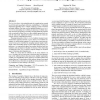Free Online Productivity Tools
i2Speak
i2Symbol
i2OCR
iTex2Img
iWeb2Print
iWeb2Shot
i2Type
iPdf2Split
iPdf2Merge
i2Bopomofo
i2Arabic
i2Style
i2Image
i2PDF
iLatex2Rtf
Sci2ools
121
click to vote
IWMM
2009
Springer
2009
Springer
A new approach to parallelising tracing algorithms
Tracing algorithms visit reachable nodes in a graph and are central to activities such as garbage collection, marshalling etc. Traditional sequential algorithms use a worklist, replacing a nodes with their unvisited children. Previous work on parallel tracing is processororiented in associating one worklist per processor: worklist insertion and removal requires no locking, and load balancing requires only occasional locking. However, since multiple queues may contain the same node, significant locking is necessary to avoid concurrent visits by competing processors. This paper presents a memory-oriented solution: memory is partitioned into segments and each segment has its own worklist containing only nodes in that segment. At a given time at most one processor owns a given worklist. By arranging separate single-readersingle-writer forwarding queues to pass nodes from processor i to processor j we can process objects in an order that gives lock-free mainline code and improved locality...
IWMM 2009 | Operating System | Reachable Nodes | Traditional Sequential Algorithms | Worklist Insertion |
Related Content
| Added | 27 May 2010 |
| Updated | 27 May 2010 |
| Type | Conference |
| Year | 2009 |
| Where | IWMM |
| Authors | Cosmin E. Oancea, Alan Mycroft, Stephen M. Watt |
Comments (0)

